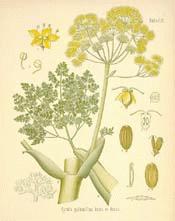
Botanical.com Home Page

|
Galbanum
(Ferula galbaniflua BOISS. ET BUHSE)
Click on graphic for larger image
|
Galbanum
Botanical: Ferula galbaniflua (BOISS. ET BUHSE)
Family: N.O. Umbelliferae
---Part Used---Gum resin.
---Habitat---Persia; also Cape of Good Hope.
---Description---There are two kinds of Galbanum in commerce, viz. Levant Galbanurn and the Persian Galbanum. The latter is softer than the Levant, has a more terebinthic odour, has the smell and consistency of Venice turpentine, and contains fruit and fragments of stalks in place of bits of sliced roots. Several species of Ferula are used as a source for commercial Galbanum, but the official plant is Ferula galbaniflua, a perennial, with smooth stem, and shining leaflets, ovate, wedge-shaped, acute and finely serrated on the edges. The umbels of flowers are few, the seeds shiny.
The whole plant abounds with a milky juice, which oozes from the joints of old plants, and exudes and hardens from the base of the stem after it has been cut down, then is finally obtained by incisions made in the root. The juice from the root soon hardens and forms the tears of the Galbanum of Commerce. The best tears are palish externally and about the size of a hazel nut and when broken open are composed of clear white tears. The taste is unpleasant, bitterish, acrid, with a strong, peculiar, somewhat aromatic smell. The common kind is an agglutinated mass, showing reddish and white tears, this is of the consistency of firm wax, and can easily be torn to pieces and softened by heat; when cold it is brittle, and mixed with seeds and leaves, when imported in lumps it is often considered preferable to the tears as it contains more volatile oil. Distilled with water it yields a quantity of essential oil, about 6 drachms, to 1 lb. of gum. It was well known to the ancients and Pliny called it 'bubonion.' Galbanum under dry distillation yields a thick oil of a bluish colour, which after purification becomes the blue colour of the oil obtained from the flowers of Matricaria Chamomilla.
---Constituents---Gum resin, mineral constituents, volatile oil, umbelliferine, galbaresino-tannol.
---Medicinal Action and Uses---Stimulant, expectorant in chronic bronchitis. Antispasmodic and considered an intermediate between ammoniac and asafoetida for relieving the air passages, in pill form it is specially good, in some forms of hysteria, and used externally as a plaster for inflammatory swellings.
---Preparations and Dosage---In pill form 10 to 20 grains, or as an emulsion, mixed with gum, sugar and water.
---Other species---In Beyrout the people use the root of F. Hermonic, commonly known as Zalou root, as an aphrodisiac.
[Top]
Common Name Index
A MODERN HERBAL Home Page
Bear in mind "A Modern Herbal" was written with the conventional wisdom of the early 1900's. This should be taken into account as some of the information may now be considered inaccurate, or not in accordance with modern medicine.
© Copyright Protected 1995-2024 Botanical.com
|

